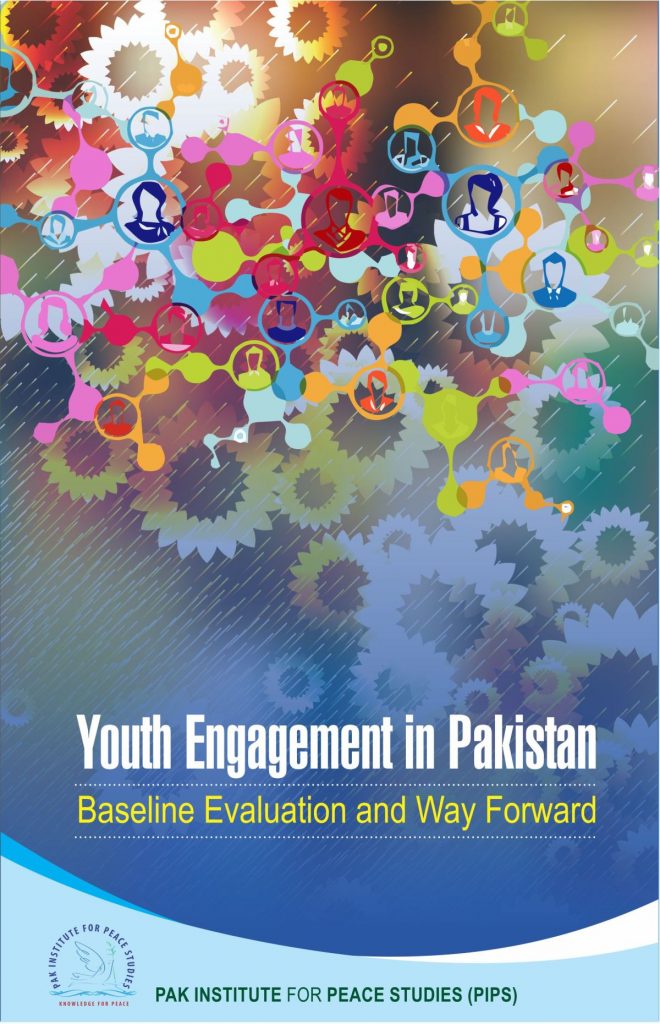Youth Engagement in Pakistan: Baseline Evaluation and Way Forward

- After Study Hours: Exploring the Madrassah Mindset
- Education for peace and harmony
- Reconstruction of the National narratives and Counter-Violent Extremism Model for Pakistan
- Role of Post-Noon Engagements of Madrassa Students in Radical Orientation
- Promoting Inclusive and Tolerant Educational Narratives
- Islam, Democracy and the Constitution of Pakistan
- Minority Rights in Pakistan: Historic Neglect or State Complicity?
- “Creating an environment that counteracts militant ideologies and radicalism in Pakistan”
- Through Each Other’s Eyes
- The Role of Ulema in Promotion of Peace and Harmony in Society
- Critical Ideologies: A Debate on Takfeer & Khurooj
- سماجی ہم آہنگی ، رواداری اور تعلیم
- سماجی ہم آہنگی کیسے ہو؟
- اسلام جمہوریت اور آئین پاکستان
- پر امن اور متوازن معاشرے کے قیام میں علماء کا کردار
- اسلام جمہوریت اور پاکستان
- ایک دوسرے کے نظر سے
- مسئلہ تکفیر و خروج
- Media Safety in Pakistan
- تعلیم امن اور ہم آہنگی
- Regulating Broadcast Media: Challenges & Reforms
- Pakistan’s Sectarian Mire & The Way Forward
- Dialogue Pakistan 2019 report
- Pakistan’s achievements in war on terror but at what cost: a special review of the current decade
- Pakistan in changing world order
- Who Am I
- Academic and Intellectual Dialogue on Social Harmony, Tolerance and Education
- Youth Engagement in Pakistan: Baseline Evaluation and Way Forward
- Dialogue Pakistan 2020
- Strengthening Governance in Pakistan
- Youth Perspective on Society, Religion, And Politics
- Supporting the Afghan peace process: Pakistan’s position, interests and policy options
- Afghanistan as Seen from Pakistan I
- Afghanistan as Seen from Pakistan II
- Perspectives from Pakistan on Afghan peace and reconciliation 1
- Discourse with Balochistan Youth on Society, Religion, and Politics
- Perspectives From Pakistan on Afghan Peace and Reconciliation 2
- How Youth in Sindh View State, Religion and Politics
- Afghan Peace and Reconciliation: Pakistan’s Interests and Policy Options II
- Interfaith Relations in Pakistan Perspectives and Worldview of Youth in Punjab
- Pakistan’s CounterExtremism Challenge and Policy Recourse
- Afghanistan as Seen from Pakistan III
- Making Sense of Pakistani Youth How Youth in Pakistan View State, Society, Religion, and Politics
- PERSPECTIVES FROM PAKISTAN ON AFGHAN PEACE AND RECONCILIATION 3
- AFGHAN PEACE AND RECONCILIATION: PAKISTAN'S INTERESTS AND POLICY OPTIONS 3
- A Path to Peace
- Countering Violent Extremism on Campuses A Faculty-Oriented Policy Brief
- PERSPECTIVES FROM PAKISTAN ON AFGHAN PEACE AND RECONCILIATION 4
- Afghanistan as Seen from Pakistan IV
- AFGHAN PEACE AND RECONCILIATION: PAKISTAN’S INTERESTS AND POLICY OPTIONS 4
- POLICY BRIEF APRIL-JUNE, 2022
- Afghanistan as Seen from Pakistan V
- AFGHAN PEACE AND RECONCILIATION: PAKISTAN’S INTERESTS AND POLICY OPTIONS 5
- PERSPECTIVES FROM PAKISTAN ON AFGHAN PEACE AND RECONCILIATION 5
- Charter of Peace
- AFGHAN PEACE AND RECONCILIATION: PAKISTAN'S INTERESTS AND POLICY OPTIONS VI
- AFGHANISTAN AS SEEN FROM PAKISTAN-VI
- PERSPECTIVES FROM PAKISTAN ON AFGHAN PEACE AND RECONCILIATION 6
- POLICY BRIEF 2
- POLICY BRIEF October December, 2022
- Youth for interfaith harmony Newsletter 1
- AFGHAN PEACE AND RECONCILIATION: PAKISTAN’S INTERESTS AND POLICY OPTIONS
- PERSPECTIVES FROM PAKISTAN ON AFGHAN PEACE AND RECONCILIATION 7
- AFGHANISTAN AS SEEN FROM PAKISTAN-VII
- YOUTH AND THE SOCIAL CONTRACT IN PAKISTAN
- Pakistan’s Afghan perspective and policy options
- POLICY BRIEF January-March, 2023
- Charter of Peace
- PERSPECTIVES FROM PAKISTAN ON AFGHAN PEACE AND RECONCILIATION 8
- AFGHANISTAN AS SEEN FROM PAKISTAN-VIII
- AFGHAN PEACE AND RECONCILIATION: PAKISTAN'S INTERESTS AND POLICY OPTIONS 8
- AFGHAN PEACE AND RECONCILIATION: PAKISTAN’S INTERESTS AND POLICY OPTIONS 9
- Policy Brief April- May 2023
- POLICY BRIEF Jun- Aug 2023
- AFGHAN PEACE AND RECONCILIATION: PAKISTAN'S INTERESTS AND POLICY OPTIONS - 11
- Pakistan's Evolving Militant Landscape: State Responses and Policy options
- AFGHAN PEACE AND RECONCILIATION: PAKISTAN’S INTERESTS AND POLICY OPTIONS – 12
- TRENDLINES OF PAKISTAN'S SECURITY CHALLENGES
- Quarterly Newsletter Oct - Dec 2024
- QUARTERLY NEWSLETTER| January-March, 2025
- MAINSTREAMING THE "TERRORISTS": INTERIM GOVERNMENTS IN AFGHANISTAN & SYRIA
- QUARTERLY NEWSLETTER| APRIL-JUNE, 2025
This report is an empirical account of the nature and scope of youth engagement in Pakistan and how it can be improved to yield better results and impact. It also explores, based on a comprehensive survey, Pakistani youth’s emerging thinking patterns and sociocultural, political and ideological-religious standpoints, as well as challenges like violent extremism and ideological radicalism. One section, in particular, explains the ways and strategies that can be employed in effectively engaging the youth for the purpose of promoting peace and harmony and reducing the appeal of violent extremism in the youth. Finally, this report lists a range of recommendations for improving the existing programs of youth engagement, investing into less explored and relatively new avenues of engagement, and better strategizing methodologies, themes and frameworks for engaging the youth.
PIPS believes that the report will contribute in improving empirical knowledge base on the best possible ways and strategies of youth engagement. It also anticipates that the report will increase the focus and ability of the state institutions and civil society organizations to unfold and their potential and energies for improving determinants of socioeconomic and political development and a positive social change.

